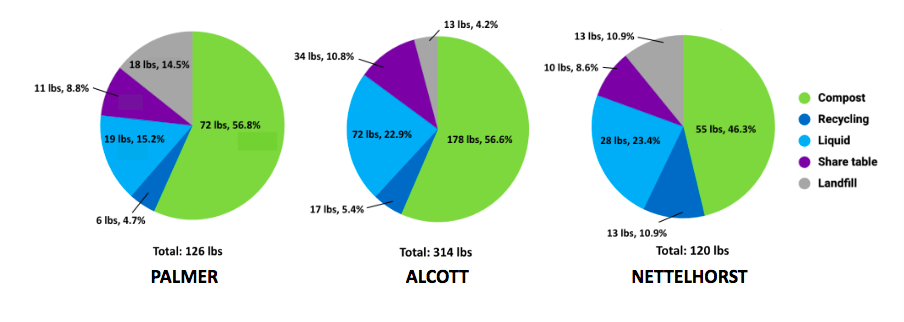Three more schools in Chicago Public Schools are ending the academic year by going green! John M. Palmer Elementary, Alcott College Prep Elementary, and Louis B. Nettelhorst Elementary all launched zero waste programs in the month of April. With this latest expansion, the Zero Waste Schools (ZWS) team at Seven Generations Ahead has now launched zero waste programs at 25 CPS schools.
John M. Palmer Elementary:
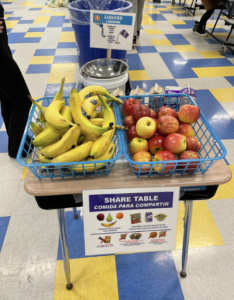
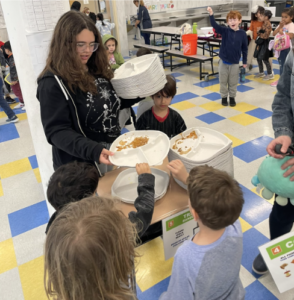 PreK teacher and Pilot Light Education Fellow, Heidi Russell, championed the zero waste launch at Palmer Elementary with strong support from the school principal. The Pilot Light’s Food Education Fellowship was created to invest in PreK – 12 teacher leaders like Russell who are committed to bringing food education to their students and to providing them the support they need to start initiatives like the Zero Waste Schools program.
PreK teacher and Pilot Light Education Fellow, Heidi Russell, championed the zero waste launch at Palmer Elementary with strong support from the school principal. The Pilot Light’s Food Education Fellowship was created to invest in PreK – 12 teacher leaders like Russell who are committed to bringing food education to their students and to providing them the support they need to start initiatives like the Zero Waste Schools program.
“I joined Pilot Light as an opportunity to teach my students about advocacy, conservation, culture, and community through the wonderful lens of food,” said Russell. “Not only have we learned about making healthier choices with our eating habits, but we have learned the importance of advocating for the food we consume and the garbage it also produces.”
Russell’s advocacy through Pilot Light led to starting a school wide composting program and tending an edible garden. A unique feature of Palmer’s zero waste program is that some of the fruits and vegetables are composted in an onsite garden that feeds the school’s very own chickens!
Some additional highlights from the Palmer launch include:
- – At the end of all lunch periods, there were 17 pounds of recycling, 34 pounds of food on the share table, and 178 pounds of compost.
- – The school went from generating 15 bags of garbage to just one!
- – Student volunteers eagerly helped with sorting during various lunch periods.
- – PreK students are participating in the program with assistance from their teachers.
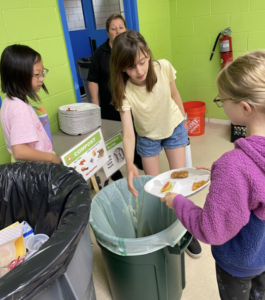 Alcott Elementary:
Alcott Elementary:
At Alcott Elementary, the zero waste program was a community effort with the school’s principal, custodial staff, students, and parents working together to make it a success. One of the lead parent volunteers organized other parents to help in the lunchroom during the first week of sorting, with a plan to train students on sorting procedures and transition to student monitors after the first week.
Highlights from the Alcott launch include:
- – At the end of all lunch periods, there were 72 pounds of compost, 11 pounds of food on the share table, and six pounds of recycling.
- – The school went from generating 12 bags of trash to just one.
- – Sorting waste is just the start for Alcott on their zero waste journey. Next school year they plan to implement other waste reduction measures such as bulk condiment dispensers and utensil/napkin dispensers.
Louis B. Nettelhorst Elementary:
In a first for SGA’s Zero Waste Schools program, our team provided remote support and resources for a zero waste launch. CPS parent, Sarah Farrell, who was the point person for the zero waste launch at Hawthorne Scholastic Academy, was eager to expand the program and reached out to the ZWS team about launching Nettlehorst. Backed by enthusiastic support from the school principal, Farrell spearheaded on-the-ground efforts and worked closely with Nettelhorst’s librarian to prepare for launch day.
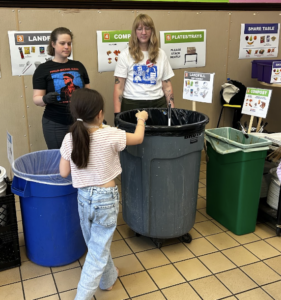 SGA provided resources such as signs and training materials and answered questions as they came up. Farrell and other volunteers oversaw launch day operations and weighed the different waste streams, conveying that information to the ZWS team who used it to create the final launch day report.
SGA provided resources such as signs and training materials and answered questions as they came up. Farrell and other volunteers oversaw launch day operations and weighed the different waste streams, conveying that information to the ZWS team who used it to create the final launch day report.
Highlights from the Nettelhorst Elementary launch include:
- – At the end of all lunch periods, there were 55 pound of compost, 13 pounds of recycling, and 10 pounds of food on the share table.
- – The school went from 10 generating bags of trash to just one.
- – Parent lead Sarah Farrell created a how-to document that outlined the zero waste lunch process for all stakeholders.
The Zero Waste Schools team notes that they are starting to see a ripple effect with the program across the district. Parents are talking to other parents, and teachers are talking with other teachers which is leading to more requests to implement the program in their respective schools.
When going green at school is both impactful and educational, it’s an idea that’s bound to catch on!
